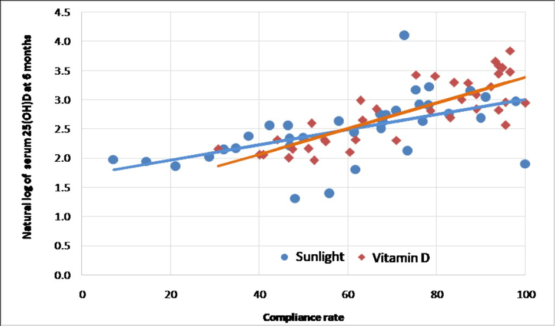The Sunshine Vitamin: The Importance of Vitamin D for Infants and Adults
March 2nd, 2023
Vitamin D, also known as the sunshine vitamin, plays a vital role in our health. It helps our bodies absorb calcium, promotes bone growth, and strengthens our immune system. Despite the importance of this vitamin, deficiency remains a common problem worldwide, affecting people of all ages. In particular, infants and adults are at a higher risk of deficiency, which can lead to serious health issues.
A recent study published in the Indian Pediatrics Journal has shed light on the importance of vitamin D for infants in particular and the effectiveness of sunlight exposure versus oral supplementation in preventing vitamin D deficiency in general. The study found that sunlight exposure is an effective and safe way to increase vitamin D levels in infants, especially those living in sunny regions. However, for infants living in areas with limited sunlight exposure, oral supplementation can be a recommended option.
Fig. 1, GOYAL, ET AL.: Interaction between compliance rate and the natural log of infant’s serum 25(OH)D at 6 months.
But the importance of vitamin D is not limited to infants. Adults also need sufficient vitamin D for optimal health. Vitamin D plays a crucial role in preventing chronic diseases, including osteoporosis, cardiovascular disease, diabetes, and some cancers. Vitamin D deficiency has also been linked to depression and other mental health issues. A study published in the Journal of Investigative Dermatology found that “moderate sunlight exposure on a regular basis is the best way to optimize vitamin D levels in the body.”
Sunlight is the most natural source of vitamin D, as our bodies can produce vitamin D when exposed to sunlight. However, several factors can affect the amount of vitamin D produced, such as time of day, season, latitude, and skin color. It is also important not to have excessive exposure to sunlight and risking being burned, which then can have negative effects on the skin, such as an increased risk of skin cancer.
In addition to sunlight exposure, vitamin D can also be obtained through dietary sources and supplements. Fatty fish, egg yolks, and fortified dairy products are excellent sources of vitamin D. However, it can be challenging to obtain sufficient vitamin D through diet alone, especially for those who follow a vegan or vegetarian diet. Therefore, supplements can be a useful option for individuals who are at risk of deficiency, such as infants and adults who have limited sun exposure or inadequate dietary intake.
For adults the best time to be exposed to sunlight to get the best vitamin D intake, as recommended by the U.S. National Institutes of Health (NIH), the U.S. Centers for Disease Control and Prevention (CDC), and the World Health Organization (WHO), is between 10 am and 3 pm, when the sun’s rays are the strongest. During this time, the body can produce vitamin D more efficiently. However, it’s important to note that prolonged exposure to strong sunlight can also increase the risk of skin damage and skin cancer. The amount of time needed for optimal vitamin D production varies depending on a number of factors, such as skin tone, age, and geographic location. As a general rule of thumb, experts recommend exposing the skin to sunlight for around 10-30 minutes a day, at least two to three times a week. It’s important to note that this should be done without sunscreen, as sunscreen can block the UVB rays that are needed for vitamin D production. However, the Indian Pediatrics study recommends that infants receive sunlight exposure for at least 30 minutes a day, ideally in the morning or late afternoon when the UV index is low. The study found that a daily dose of 400 IU of vitamin D is sufficient for most infants.
In conclusion, sunlight is a natural and effective source of vitamin D for people of all ages, which is an essential nutrient that plays a crucial role in our overall health. As the study suggests, “Infants and their caregivers should be encouraged to get outside in the sun whenever possible.” Additionally, adults can benefit from regular sunlight exposure to maintain healthy vitamin D levels. While supplements can be a convenient alternative, they may not be as effective as the real thing. As the study concludes, “Public health strategies that promote sunlight exposure for vitamin D sufficiency should be reconsidered and emphasized for all ages, particularly for infants and children.” So, let’s make the most of the sunshine and enjoy its many benefits while staying safe under its warm embrace.
Media contact: Jonas Noswitz, ESA Communications Officer
Jonas.noswitz@europeansunlight.eu
References:
- Goyal A, Dabas A, Shah D, et al. Sunlight Exposure vs Oral Vitamin D Supplementation for Prevention of Vitamin D Deficiency in Infancy: A Randomized Controlled Trial. Indian Pediatrics. 2022;59(11):852-856. doi: 10.1007/s13312-022-2475-8
- Wacker, M. & Holick, M.F. “Sunlight and Vitamin D: A global perspective for health.” Journal of Investigative Dermatology Symposium Proceedings 17, no. 2 (2012): 26-32.
- National Institutes of Health. “Vitamin D.” Updated February 2021. Available at: https://ods.od.nih.gov/factsheets/VitaminD-HealthProfessional/
- Centers for Disease Control and Prevention. “Vitamin D.” Updated November 2021. Available at: https://www.cdc.gov/nutrition/infantandtoddlernutrition/vitamins-minerals/vitamin-d.html
- World Health Organization. “Sun protection and the benefits of sunlight exposure.” Available at: https://www.who.int/uv/sun_protection/en/

